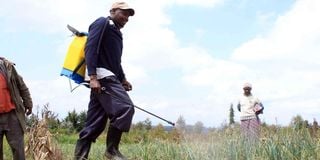Premium
Kenya to gain from Sh1.7bn pest control options

A farmer sprays his onion crop with a herbicide in Endarasha, Nyeri County. Kenya to gain from Sh1.7bn pest control options.
Kenya is among nine low and middle-income countries in Africa, Asia and Latin America that will benefit from more than $13 million (Sh1.7 billion) in funding by CropLife International to boost pest management.
CropLife is a global trade association of agrochemical firms based in Belgium.
The five-year funding, dubbed Sustainable Pesticide Management Framework (SPMF), is on in Kenya, Morocco, Thailand and Vietnam.
According to CropLife, the SPMF is rooted in the industry’s foundational commitment to the International Code of Conduct on Pesticide Management.
It also paves the way for the adoption of new technology to support the demand for sustainable alternatives and practices such as Integrated Pest Management (IPM).
The programme makes specific reference to Highly Hazardous Pesticides (HHPs). It is envisaged that by 2035, stakeholders will have taken effective measures to phase out HHPs in agriculture.
It is also expected to yield safer and affordable alternatives; and to promote transition to the alternatives.
Farmers are learning to control an increasing number of new invasive species.
“With a warming planet, tackling pollution, protecting biodiversity and boosting food security are complex and interlinked challenges. They must be addressed in a horizontal, holistic and inclusive manner,” said Emily Rees CEO of CropLife International
CropLife launched SPMF together with BASF Agricultural Solutions, Bayer Crop Science, Corteva Agriscience, FMC Corporation, Sumitomo Chemicals and Syngenta AG in 2021.
As global temperatures rise, there has been a dramatic increase in invasive pests and diseases, which in combination with water scarcity challenges affect overall crop productivity, she said.





